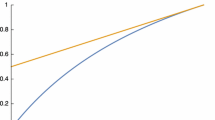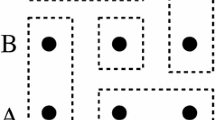Abstract
This paper studies implications of the consistency conditions among prior, posteriors, and information sets on introspective properties of qualitative belief induced from information sets. The main result reformulates the consistency conditions as: (i) the information sets, without any assumption, almost surely form a partition; and (ii) the posterior at a state is equal to the Bayes conditional probability given the corresponding information set. The main implication of this result is to provide a tractable epistemic model which dispenses with the technical assumptions inherent in the standard epistemic model such as the countable number of information sets. Applications are agreement theorem, no-trade theorem, and the epistemic characterization of correlated equilibria. Implications are as follows. First, since qualitative belief reduces to fully introspective knowledge in the standard environment, a care must be taken when one studies non-veridical belief or non-introspective knowledge. Second, an information partition compatible with the consistency conditions is uniquely determined by the posteriors. Third, qualitative and probability-one beliefs satisfy truth axiom almost surely. The paper also sheds light on how the additivity of the posteriors yields negative introspective properties of beliefs.
Similar content being viewed by others
References
Aumann, R., Brandenburger, A.: Epistemic conditions for Nash equilibrium. Econometrica 63(5), 1161–1180 (1995)
Aumann, R.J.: Subjectivity and correlation in randomized strategies. J. Math. Econ. 1, 67–96 (1974)
Aumann, R.J.: Agreeing to disagree. Ann. Stat. 4(6), 1236–1239 (1976)
Aumann, R.J.: Correlated equilibrium as an expression of Bayesian rationality. Econometrica 55(1), 1–18 (1987)
Aumann, R.J.: Interactive epistemology I. Int. J. Game Theory 28(3), 263–300 (1999)
Aumann, R.J.: Interactive epistemology II. Int. J. Game Theory 28(3), 301–314 (1999)
Bacharach, M.: Some extensions of a claim of Aumann in an axiomatic model of knowledge. J. Econ. Theory 37(1), 167–190 (1985)
Barelli, P.: Consistency of beliefs and epistemic conditions for Nash and correlated equilibria. Games Econom. Behav. 67, 363–375 (2009)
Battigalli, P., Bonanno, G.: Recent results on belief, knowledge and the epistemic foundations of game theory. Res. Econ. 53(2), 149–225 (1999)
Battigalli, P., Siniscalchi, M.: Hierarchies of conditional beliefs and interactive epistemology in dynamic games. J. Econ. Theory 88(1), 188–230 (1999)
Battigalli, P., Siniscalchi, M.: Strong belief and forward induction reasoning. J. Econ. Theory 106(2), 356–391 (2002)
Bonanno, G.: Information, knowledge and belief. Bull. Econ. Res. 54(1), 47–67 (2002)
Bonanno, G.: A syntactic approach to rationality in games with ordinal payoffs. In: Bonanno, G., van der Hoek, W., Wooldridge, M. (eds) Logic and the Foundations of Game and Decision Theory (LOFT 7), pp. 59–86. Amsterdam University Press (2008)
Bonanno, G., Nehring, K.: Assessing the truth axiom under incomplete information. Math. Soc. Sci. 36, 3–29 (1998)
Bonanno, G., Nehring, K.: How to make sense of the common prior assumption under incomplete information. Int. J. Game Theory 28(3), 409–434 (1999)
Bonanno, G., Tsakas, E.: Common belief of weak-dominance rationality in strategic-form games: a qualitative analysis. Games Econom. Behav. 112, 231–241 (2018)
Brandenburger, A., Dekel, E.: Common knowledge with probability 1. J. Math. Econ. 16(3), 237–245 (1987)
Brandenburger, A., Dekel, E., Geanakoplos, J.: Correlated equilibrium with generalized information structures. Games Econom. Behav. 4(2), 182–201 (1992)
Chen, Y.-C., Ely, J.C., Luo, X.: Note on unawareness: negative introspection versus AU introspection (and KU introspection). Int. J. Game Theory 41(2), 325–329 (2012)
Dekel, E., Gul, F.: Rationality and knowledge in game theory. In: Kreps, D. M., Wallis, K. F. (eds) Advances in Economics and Econometrics: Theory and Applications, Seventh World Congress. vol. 1, pp. 87–172. Cambridge University Press (1997)
Dekel, E., Lipman, B.L., Rustichini, A.: Standard state-space models preclude unawareness. Econometrica 66(1), 159–173 (1998)
Di Tillio, A., Halpern, J., Samet, D.: Conditional belief types. Games Econom. Behav. 87, 253–268 (2014)
Dubra, J., Echenique, F.: Information is not about measurability. Math. Soc. Sci. 47(2), 177–185 (2004)
Feinberg, Y.: Characterizing common priors in the form of posteriors. J. Econ. Theory 91(2), 127–179 (2000)
Friedenberg, A., Keisler, H.J.: Iterated dominance revisited. Econ. Theory 72, 377–421 (2021). https://doi.org/10.1007/s00199-020-01275-z
Fukuda, S.: Epistemic foundations for set-algebraic representations of knowledge. J. Math. Econ. 84, 73–82 (2019)
Fukuda, S.: Formalizing common belief with no underlying assumption on individual beliefs. Games Econom. Behav. 121, 169–189 (2020)
Fukuda, S.: Unawareness without AU introspection. J. Math. Econ. 94, 102456 (2021)
Fukuda, S.: The existence of universal qualitative belief spaces. J. Econ. Theory 216, 105784 (2024)
Gaifman, H.: A theory of higher order probabilities. In: Skyrms B., Harper W. (eds) Causation, Chance, and Credence, pp. 191–219. Kluwer (1988)
Geanakoplos, J.: Game theory without partitions, and applications to speculation and consensus. B.E. J. Theor. Econ. 21.2, 361–394 (2021)
Ghirardato, P.: Coping with ignorance: unforeseen contingencies and non-additive uncertainty. Econ. Theor. 17(2), 247–276 (2001). https://doi.org/10.1007/PL00004108
Golub, B., Morris, S.: Higher-order expectations (2017)
Green, E.J.: Events concerning knowledge. (2012)
Guarino, P.: The topology-free construction of the universal type structure for conditional probability systems. In: Lang, J. (eds) Proceedings of the 16th Conference on Theoretical Aspects of Rationality and Knowledge (2017)
Guarino, P., Ziegler, G.: Optimism and pessimism in strategic interactions under ignorance. Games Econom. Behav. 136, 559–585 (2022)
Halpern, J.Y.: The relationship between knowledge, belief, and certainty. Ann. Math. Artif. Intell. 4(3–4), 301–322 (1991)
Harsanyi, J.C.: Games with incomplete information played by “Bayesian’’ players, I–III. Manag. Sci. 14, 159–182 (1967)
Heifetz, A.: The positive foundation of the common prior assumption. Games Econom. Behav. 56(1), 105–120 (2006)
Heifetz, A., Meier, M., Schipper, B.C.: Unawareness, beliefs, and speculative trade. Games Econom. Behav. 77(1), 100–121 (2013)
Hellman, Z.: Iterated expectations, compact spaces, and common priors. Games Econom. Behav. 72(1), 163–171 (2011)
Hérves-Beloso, C., Monteiro, P.K.: Information and \(\sigma \)-algebras. Econ. Theor. 54(2), 405–418 (2013). https://doi.org/10.1007/s00199-012-0723-1
Hillas, J., Samet, D.: Dominance rationality: a unified approach. Games Econom. Behav. 119, 189–196 (2020)
Hintikka, J.: Knowledge and Belief: An Introduction to the Logic of the Two Notions. Cornell University Press, Ithaca (1962)
Hoffmann-Jørgensen, J.: Probability with a View toward Statistics, vol. I. Chapman & Hall, London (1994)
Kajii, A., Morris, S.: Common \(p\)-belief: the general case. Games Econom. Behav. 18(1), 73–82 (1997)
Kajii, A., Morris, S.: The robustness of equilibria to incomplete information. Econometrica 65(6), 1283–1309 (1997)
Koutsougeras, L.C., Yannelis, N.C.: A note on information, trade and common knowledge. In: Nishimura, K. (eds) pp. 403–409. Springer (2017)
Kovach, M.: Ambiguity and partial bayesian updating. Econ. Theory (2023). https://doi.org/10.1007/s00199-023-01528-7
Lee, J.J.: Formalization of Information: knowledge and belief. Econ. Theory 66(4), 1007–1022 (2018). https://doi.org/10.1007/s00199-017-1078-4
Lenzen, W.: Recent Work in Epistemic Logic. Acta Philos. Fenn. 30(2), 1–219 (1978)
Lipman, B.L.: Information processing and bounded rationality: a survey. Can. J. Econ. 28(1), 42–67 (1995)
Maus, S.: Balancedness and the core in economies with asymmetric information. Econ. Theory 22, 613–627 (2003). https://doi.org/10.1007/s00199-002-0343-2
Meier, M.: Universal knowledge-belief structures. Games Econ. Behav. 62(1), 53–66 (2008)
Mertens, J.F., Zamir, S.: Formulation of Bayesian analysis for games with incomplete information. Int. J. Game Theory 14(1), 1–29 (1985)
Milgrom, P., Stokey, N.: Information, trade and common knowledge. J. Econ. Theory 26(1), 17–27 (1982)
Modica, S., Rustichini, A.: Awareness and partitional information structures. Theory Decis. 37(1), 107–124 (1994)
Modica, S., Rustichini, A.: Unawareness and partitional information structures. Games Econ. Behav. 27(2), 265–298 (1999)
Monderer, D., Samet, D.: Approximating common knowledge with common beliefs. Games Econ. Behav. 1(2), 170–190 (1989)
Morris, S.: Trade with heterogeneous prior beliefs and asymmetric information. Econometrica 62(6), 1327–1347 (1994)
Morris, S.: The logic of belief and belief change: a decision theoretic approach. J. Econ. Theory 69(1), 1–23 (1996)
Morris, S., Rob, R., Shin, H.S.: \(p\)-Dominance and belief potential. Econometrica (1995)
Mukerji, S.: Understanding the nonadditive probability decision model. Econ. Theory 9(1), 23–46 (1997). https://doi.org/10.1007/BF01213441
Neeman, Z.: Approximating agreeing to disagree results with common \(p\)-beliefs. Games Econ. Behav. 12(1), 162–164 (1996)
Neeman, Z.: Common beliefs and the existence of speculative trade. Games Econ. Behav. 16, 77–96 (1996)
Nehring, K.: Common priors under incomplete information: a unification. Econ. Theor. 18(3), 535–553 (2001). https://doi.org/10.1007/PL00004199
Rubinstein, A.: The electronic mail game: strategic behavior under “almost common knowledge’’. Am. Econ. Rev. 79(3), 385–391 (1989)
Samet, D.: Ignoring ignorance and agreeing to disagree. J. Econ. Theory 52(1), 190–207 (1990)
Samet, D.: Agreeing to disagree in infinite information structures. Int. J. Game Theory 21(2), 213–218 (1992)
Samet, D.: Iterated expectations and common priors. Games Econ. Behav. 24(1–2), 131–141 (1998)
Samet, D.: Bayesianism without learning. Res. Econ. 53(2), 227–242 (1999)
Samet, D.: Quantified beliefs and believed quantities. J. Econ. Theory 95, 169–185 (2000)
Samet, D.: Common belief of rationality in games with perfect information. Games Econ. Behav. 79, 192–200 (2013)
Shin, H.S.: Logical structure of common knowledge. J. Econ. Theory 60(1), 1–13 (1993)
Sonsino, D.: “Impossibility of speculation" theorem with noisy information. Games Econ. Behav. 8, 406–423 (1995)
Stalnaker, R.: On the evaluation of solution concepts. Theory Decis. 37(1), 49–73 (1994)
Tan, T.C.-C., Werlang, SRd.C.: The Bayesian foundations of solution concepts of games. J. Econ. Theory 45.2, 370–391 (1988)
Tóbiás, A.: A unified epistemological theory of information processing. Theory Decis. 90, 63–83 (2021)
Tsakas, E.: “Agreeing to disagree with conditional probability systems”. B.E. J. Theor. Econ. 18(2) (2018)
Vassilakis, S., Zamir, S.: Common belief and common knowledge. J. Math. Econ. 22(5), 495–505 (1993)
Weinstein, J., Yildiz, M.: Impact of higher-order uncertainty. Games Econ. Behav. 60, 200–212 (2007)
Yannelis, N.C.: The core of an economy with differential information. Econ. Theory 1, 183–198 (1991). https://doi.org/10.1007/BF01211533
Author information
Authors and Affiliations
Corresponding author
Additional information
Publisher's Note
Springer Nature remains neutral with regard to jurisdictional claims in published maps and institutional affiliations.
I would like to thank Atsushi Kajii, Nobuo Koida, Massimo Marinacci, Sujoy Mukerji, Eric Pacuit, Burkhard Schipper, Takashi Ui, and the seminar participants at TARK 2019 and SWET/DTW 2019 for their insightful comments and discussions. I would also like to thank two anonymous reviewers and the handling editor for their valuable comments.
Rights and permissions
Springer Nature or its licensor (e.g. a society or other partner) holds exclusive rights to this article under a publishing agreement with the author(s) or other rightsholder(s); author self-archiving of the accepted manuscript version of this article is solely governed by the terms of such publishing agreement and applicable law.
About this article
Cite this article
Fukuda, S. On the consistency among prior, posteriors, and information sets. Econ Theory (2024). https://doi.org/10.1007/s00199-024-01558-9
Received:
Accepted:
Published:
DOI: https://doi.org/10.1007/s00199-024-01558-9




